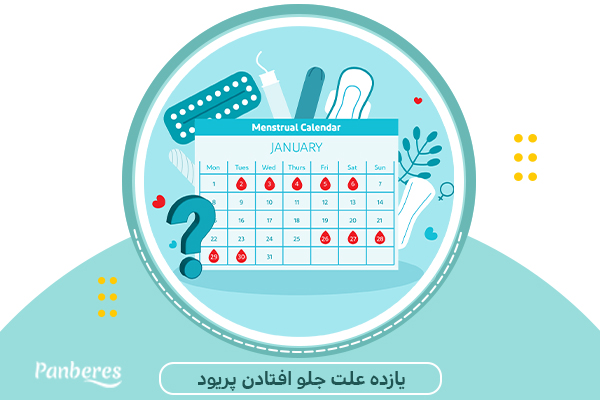آنچه در این مجله می خوانید
Toggle
What causes early menstruation? When your period comes early, you have many concerns about women’s health. Women’s menstrual cycle occurs every 28 days, but sometimes you get your period every two months, and sometimes every 26, 35, or 42 days.Normal menstruation should occur at interval of 25 to 35 days; that is, it should take 25 to 35 days from the onset of the first bleeding to the next bleeding. Many women whose periods do not occur on the same day each month (for example, the 25th of each month) think that their periods are not normal. But these women should not worry because menstruation does not have to occur on the exact same day. A change of two or three days in menstruation is not a particular problem. However, if the interval between two periods is less than 25 days or more than 35 days, a doctor should be consulted.
Article Suggested by Editor: In Which Age Periods Stop?
Menstruation is, especially during adolescence and the first year of puberty, irregular because the body’s hormonal system has not yet started working properly. This may continue for two years or even more. Around the age of 45 to 50, when most women approach menopause, the hormonal system is almost exhausted and menstruation becomes irregular. This will continue until menopause! Even if we ignore the issue of age, irregular menstruation is still not a big deal. However, if your menstrual cycle has been irregular for a long time, we recommend that you see a gynecologist. Stress, anxiety, and stressful events can cause irregular periods by altering ovulation and disrupting progesterone secretion. Problems with the thyroid, hypothalamus, or pituitary gland, which are involved in the production of female hormones, can also cause irregular periods. There may even be a problem with the ovaries and despite the command they receive from the brain, they don’t produce enough hormones! It is interesting to know that increased secretion of male hormones can also cause irregular periods. Infection, tumors, fibroids, or endometriosis can also be possible causes.
Other causes of irregular or absent menstruation include overweight, losing weight, eating disorders, and doing heavy exercises. Now we want to examine each of these in a comprehensive way together.
Suggested article: Amount of Menstrual Blood
Some of the reasons for early menstruation are as follows:
1. Puberty and the cause of early menstruation

Teenagers usually experience irregular periods when they start puberty. Statistics in this field show that most girls at this age search for the phrase “why their period is early”. At the beginning of puberty, a woman’s body begins to produce hormones. Hormones such as estrogen and progesterone. After the secretion of these hormones, their bodies undergo changes. These changes include:
- Increase in height and weight
- Increased volume of the buttocks and legs, enlargement of breast tissue
- Increased hair growth on the arms, armpits, and pubic area
- Skin changes such as increased pimples, blemishes, and acne
Changes during puberty also prepare a woman’s body for reproduction. Girls experience their first menstrual period between the age of 12 to 13. The average menstrual cycle lasts about 28 days, but some women have shorter or longer periods.
Among adolescent girls, the average cycle length is 32.2 days. In the first few years of menstruation, 90 percent of menstrual cycles last 21 to 45 days, but some may have periods outside this range. By the third year, 60 to 80 percent of menstrual cycles last 21 to 34 days. For at least the first 6 years of menstruation, a girl’s menstrual cycles may be irregular.
Selected Article: Period While Traveling
If the cause of early menstruation is puberty, should I see a doctor?
If a child starts menstruating before age 8, or develops other signs of puberty, her parents may want to seek medical attention. Meanwhile, teenage girls who don’t show signs of breast development by age 13 may have delayed puberty.
Delay in puberty can occur for a variety of reasons, including insufficient body fat, genetics, and problems affecting the ovaries.
It is recommended that you see a doctor if you have any of the above two conditions, otherwise your condition is completely normal.
2. Prior to Menopause
Menopause in women usually occurs between the age of 47 to 51. This can cause fluctuations in hormone levels, especially estrogen and follicle-stimulating hormone (FSH). Some women get their periods a few days earlier due to increased levels in FSH. Women can expect lighter and less frequent periods during this time, as estrogen levels decrease during the transition.
Some other symptoms of pre-menopause:
- Longer or shorter periods
- Heavier or lighter bleeding
- Vaginal dryness
- Changes in libido
- Hot flashes
- Mood swings and irritability
- Trouble sleeping
To find out At What Age does Menstruation Start? You can read this article.
3. Exercise
Vigorous exercise can cause irregular periods, or cause your period to stop completely. Often, this condition is associated with athletes who train for several hours a day. Exercise will only affect your periods if you burn more calories than you eat.
4. Weight Fluctuations
Period irregularities often occur with rapid weight loss. This can happen with extreme dieting, gastric bypass surgery, or eating disorders.
When the body enters starvation mode, it saves energy for essential life functions like breathing. Your body stops producing reproductive hormones, which leads to period irregularities.
5. Stress and Pressure
Severe stress can disrupt your hormone levels and cause irregular periods. If you are constantly stressed or have events in your life that cause you a lot of discomfort and pressure, it can affect your period.
6. Blood Thinning Drugs
Taking blood thinning drugs may prolong your period and cause heavy bleeding. Anticoagulants are naturally released during your menstrual cycle to help thin the lining of your uterus so it can be shed through the vagina. Taking anticoagulants can double this and increase bleeding. To learn about other possible causes of blood clots during your period, read the article “What Causes Blood Clots During Menstruation?”
7. Emergency Contraceptive (EC) Pills

Contraception with emergency pills is used to reduce the risk of pregnancy after having unprotected sex.
EC pills contain hormones that disrupt the natural process of ovulation. This may lead to an early or late period. If you use EC pills regularly, your period may become irregular.
It’s not uncommon for women to experience breakthrough bleeding after their doctor inserts an IUD. It takes a few months for your uterus to adjust to the IUD, and during this time, you may experience daily or irregular bleeding.
Selected Article: What is Man Period?
8. Sexual Diseases
Sexually transmitted diseases can cause a delay and/or early onset of menstruation. It is recommended that if you have even the slightest symptoms of a sexually transmitted disease, you should definitely see your doctor and get tested to find out about this.
Read this article to learn How to Properly Bathe During Menstrual Period.
9. Endometriosis
Endometriosis occurs when endometrial-like tissue starts to grow outside the uterus in areas such as the ovaries, abdomen and bowel. It affects around 11% of women between the ages of 15 and 44 worldwide.
In addition to unexpected bleeding, endometriosis can cause:
- Sever menstrual pains
- Chronic back pain
- Pain during or after sex
10. Diabetes
Many women with Type 2 Diabetes have irregular menstrual periods.
11. Thyroid and Early Menstruation

It is thought that one in eight women will develop thyroid disease in their lifetime. Thyroid conditions cause your body to make more or less thyroid hormone than your body needs. This hormone is essential for several body functions, including metabolism and the menstrual cycle. Your individual symptoms will depend on whether you have hypothyroidism or hyperthyroidism.
In addition to premature menstruation, you may experience the following:
- Periods that are lighter or heavier than usual
- Heart rate faster or slower than usual
- Trouble Sleeping
- Unexpected weight loss or gain
You can also read this article to Treat Period Pain.
Should we see a doctor for early menstruation?
In general, no. Unless you suffer from severe pain due to a period delay or have had a miscarriage. Also, if this early period occurs repeatedly, it is recommended that you see a doctor to determine the cause and treatment.
In this article, Panberes tried to examine all causes of early menstruation. If you are facing this problem and any of the eleven issues above are happening to you, make sure to take steps to resolve the problem.
Also, if you found this article useful or have any questions, please leave them in the “Comments” section.
How to Treat Early Menstruation?

The treatment for early menstruation depends entirely on the cause. Therefore, it is necessary to first find out what is the reason for our early menstruation and then take steps to solve it according to the problem we are having.
- Practice yoga. Yoga can be an effective treatment for various menstrual problems.
- Maintain a healthy weight.
- Exercise routine
- Spice things up with ginger.
- Add some cinnamon.
- Get your daily dose of vitamins for a healthy period.
- Drink apple cider vinegar every day.
- Eat pineapple.
Finally, it is recommended to consult a doctor if you experience frequent changes in your period timing.
Is Early Menstruation Bad?
Early periods are usually not a sign of anything serious. But if you have severe pain or discomfort, you should see a doctor. Additionally, you should seek medical attention immediately if you have had or suspect a miscarriage.
Is It Okay to Get Your Period After 15 Days?
Most women have menstrual periods that last four to seven days. Women’s periods occur every 28 days, but a normal period can be anywhere from 21 to 35 days. Examples of irregular periods include periods that are less than 21 days apart or more than 35 days apart.
Overview
An early period itself does not indicate a problem. However, if other changes occur during menstruation or if a woman is worried, a doctor should be consulted.
Hormonal fluctuations during puberty and menopause can cause periods to start earlier than expected.
Meanwhile, some sexually transmitted diseases, including chlamydia, gonorrhea, and syphilis, can cause vaginal bleeding between periods.
Additionally, implantation and miscarriage bleeding can sometimes resemble menstruation, because each can include abdominal cramps and vaginal bleeding.
It should be noted that the blood that comes in these cases may be darker than normal period blood. Anyone who is unsure can confirm the cause of the bleeding with a home pregnancy test.
During pregnancy, placental tissue is expelled from the body in the form of red, clot-like discharge. Anyone who thinks they are experiencing this should contact their doctor immediately.
The Relationship between Early Menstruation and Pregnancy
Your period will stop when your body starts producing the pregnancy hormone human chorionic gonadotropin. However, you may be pregnant and have light bleeding when your period starts. This type of bleeding is more common in early pregnancy.
With over four decades of experience in producing sanitary pads, Panberes Company is constantly striving to improve the quality of its sanitary pads. If you are planning to purchase Panberes sanitary pads and/or want to learn more about these sanitary pads, please visit the Panberes Sanitary Pads page.



